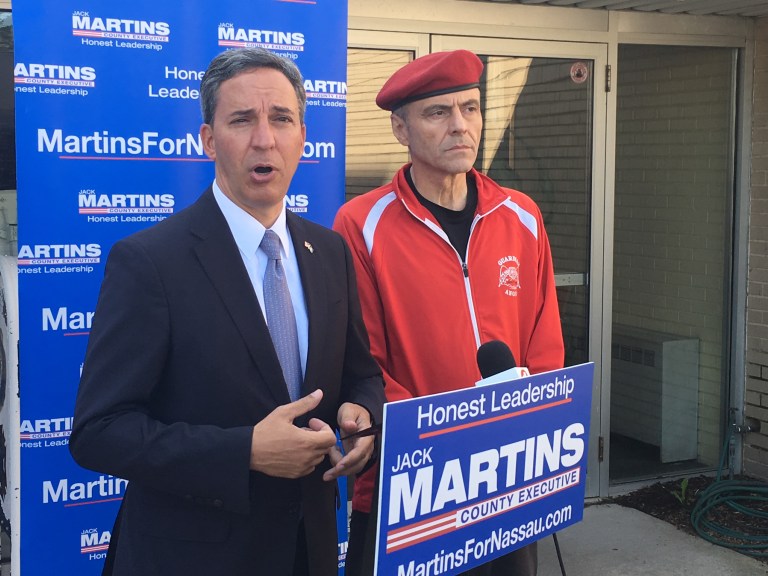
Laura Curran and Jack Martins traded barbs Wednesday when each Nassau County executive candidate proposed a policy that the other had already championed.
Martins, a Republican former state senator, proposed limiting the county executive to serving two four-year terms and county legislators to five two-year terms. But Curran, a Democratic county legislator, noted the announcement came 216 days after her own proposal.
Two hours later, Curran pledged to continue following rules created by former President Barack Obama that require public infrastructure projects to consider the long-term effects of climate change. But Martins accused Curran of being redundant, saying a 2014 state law he sponsored already contains that requirement.
Martins, like Curran and Maragos, unveiled an ethics plan in May aimed at restoring trust in government following County Executive Edward Mangano’s arrest last fall on federal corruption charges.
It included reforms to Nassau’s Board of Ethics and the ethics code it enforces, a way to remove a sitting county executive from office, and policies aimed at making the county more transparent. But term limits were initially absent.
Curran proposed limiting the county executive, comptroller and clerk to two terms and legislators to six terms when she announced her anti-corruption platform in January. County Comptroller George Maragos, Curran’s Democratic primary opponent, similarly wants to limit the county executive and legislators to eight years in office.
As Curran has, Martins noted that New York City and Suffolk County have term limits in place.
“It is important that we understand that when a person is elected to government office, that they are there to serve the people and not to ensure that they get re-elected,” Martins said at a Mineola news conference alongside Curtis Sliwa, the statewide Reform Party chairman.
Curran said she was glad Martins “finally joined the call” she made months ago.
“While he’s at it, he should join me in supporting the creation of an Independent Inspector General, ending political taxpayer-funded mail, enacting strict anti-patronage laws, increasing transparency in county budgeting, reforming our contracting system, and taking down publicly-funded signs for politicians,” Curran said in a statement.
Curran’s pledge Wednesday to follow Obama’s infrastructure rule is her latest effort to oppose Republican President Donald Trump, who revoked it on Tuesday.
The regulation was aimed at ensuring public works projects are built to protect against rising sea levels and increased flooding that come with climate change. Curran cited the damage Superstorm Sandy did as evidence of a need for the rule locally.
“We cannot and will not allow Donald Trump’s war on the environment, and his denial of the reality of climate change, to put our communities in danger,” Curran said in a news release.
But Martins pointed to the 2014 Community Risk and Resiliency Act, a state law he co-sponsored that took effect this year. It requires applicants for several state permits and funding programs to show they have weighed “future physical climate risk” due to rising sea levels and flooding.
Curran did not say how her pledge would differ, if at all, from what state law requires.
In a statement, Martins said the law requires consideration of climate change concerns under the state Environmental Quality Review Act, or SEQRA, which governs all public works projects. He accused Curran of “attempting to play politics with the serious issue of climate change.”
But the law’s full text makes no mention of SEQRA. Steven C. Russo, an environmental lawyer who was once the top attorney for the state Department of Environmental Conservation, wrote in October 2014 that it was uncertain “whether the law will have substantial practical effect.” Resilience to climate change “already become an established consideration” under SEQRA, Russo wrote, though the new law did require the DEC to create guidance for how to evaluate climate change impacts.
Because those issues “already make their way into most SEQRA reviews, this new law should be seen less as a procedural game changer and more as further confirmation that consideration of climate change adaptation and storm resiliency must be included in submissions supporting permit applications and government funding requests,” Russo wrote in a blog post for his law firm, Greenberg Traurig.
E. O’Brien Murray, a Martins spokesman, said the new law “works in tandem with SEQRA” and “eliminates any lingering uncertainty … with respect to the programs the statute addresses.”
In a statement, Maragos criticized both Martins and Curran for a lack of leadership on environmental and ethics issues.
“Martins and Curran are both part of the pay-to-play culture by accepting corrupting money from the same special interests that gave to Mangano,” Maragos said.







Martins looks out for Martins. PERIOD